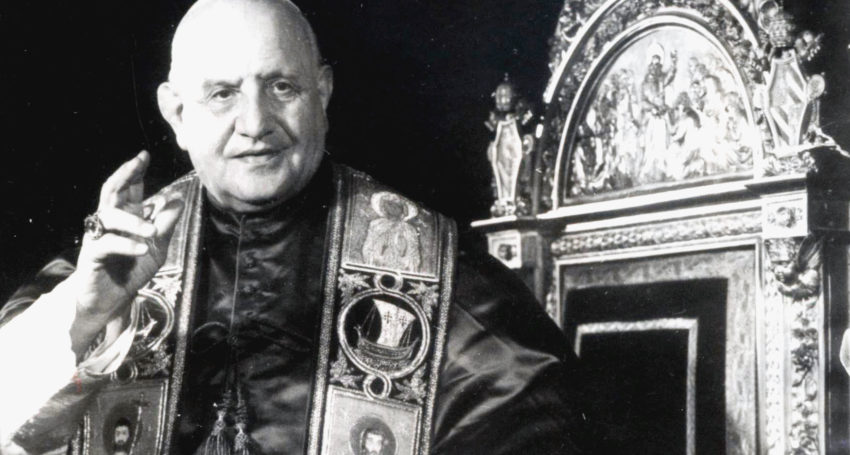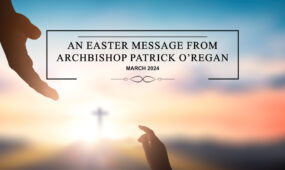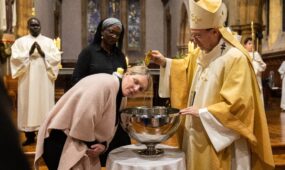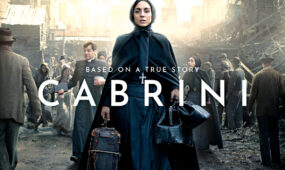Enduring truths in a changing world
Opinion
On October 11 this year, we celebrated the 60th Anniversary of the opening of the Second Vatican Council. In his opening address Pope John XXIII said: 'The greatest concern of this council is this: that the sacred and central truths of our Christian faith should be guarded and taught more effectively.' He continued: 'The substance of our central beliefs is one thing, and the way in which it is presented is another....we will also be attentive to these times, to new forms of life present in the modern world.'

The purpose of the Council was to bring the Church into modern times, not by mirroring them and changing to suite them, but by applying the enduring truth of the Gospel to them and adapting the way we present the Gospel. Again, now St John XXIII said: ‘But today we prefer to make use of the medicine of mercy rather than that of severity.’ (from Vatican II in Plain English, The Council by Bill Huebsch)
Advertisement
We are aware of changes in the Eucharist, the Mass, from Latin to the vernacular and the way that it called for the full, conscious and active participation of all the faithful. Without omitting the fact that the Church is Hierarchical (Chapter 111 of the Dogmatic Constitution on the Church) it spoke firstly of the Church as the People of God (Chapter II of the Dogmatic Constitution on the Church). It emphasized the prime Sacrament of Baptism that unites us all as equal members of the Church, part of the pilgrim People of God on mission of being the ‘light of humanity……a sign and instrument…of communion with God and of unity among all.’ (Chapter I of the Dogmatic Constitution on the Church) It is this sense of all being on mission together as the pilgrim People of God that is at the heart of the call of Pope Francis to synodality, put more simply, being together on the way.
In the Pastoral Constitution on the Church in the Modern World the Council called us all to look outwards and beyond ourselves. ‘The joy the hope, the grief and anguish of the men (and women) of our times, especially of those who are poor or afflicted in any way, are the joy the hope, the grief and anguish of the followers of Christ as well.’ The Council exhorted us to have confidence in engaging with and dialoguing with the modern world in all its issues precisely to more effectively share the Gospel word and deed. In this sense, the Council unleashed a flourish of social justice and a priority for the service of the poor.
The Council brought about a new ecumenical focus, calling us to see what we have in common with other Christian communities. It recognized that the ‘Church of Christ…subsists in the Catholic Church…Nevertheless, many elements of sanctification and of truth are found outside its visible confines.’ In this sense, many the elements we have in common with other Christians can bring us together in fellowship and prayer as we strive for that full unity that Christ prayed for. The Council was ground-breaking in acknowledging the freedom of conscience and religion that is at the very heart of being human and hence called for the respect of non-Christian religions.
The Dogmatic Constitution on Divine Revelation, whilst recognizing the truth of God’s revelation moved the focus beyond propositions of doctrine to be believed, to see revelation as God’s self-communication in love, calling all humanity into personal relationship and communion for the sake of salvation. We know too, that Vatican II called us to a renewed appreciation of the presence and power of Christ in the proclamation of the Scriptures. Over the years the sharing of the Word of God in the Scriptures has become a feature of our faith lives. We have been reminded that we are fed and nourished at the one table of the Eucharist which is of both Word and Sacrament.
Advertisement
But maybe there’s one theme of the Council that we have not placed enough emphasis upon. It’s what’s referred to as the Universal Call to Holiness.
‘All in the Church, whether they belong to the hierarchy or are cared for it, are called to holiness……..It is therefore quite clear that all Christians in whatever state of life are called to the fullness of Christian life and to the perfection of charity, and this holiness is conducive to a more human way of living in society here on earth.’ (Dogmatic Constitution on the Church, Chapter iv, The Call to Holiness)
As the Vatican Council called us to renewal in the Church, here it reminds us the that inner personal renewal of heart and holiness of life are always a priority. Structural changes in the Church and to ministries on their own will never be enough. All the baptized, not just priests and religious are called to holiness of life. In our desire to change the world we must not forget the call to start with ourselves and from within.
The Council makes the point that holiness leads to a more human way of living here on earth. We can easily think that holiness is other worldly, in the spiritual sphere only and disconnected from real human life. If only we can truly believe that to be holy is about being truly human in this life and not just in the next and that it is by holiness that we make a difference in the world. This is what the Council is saying when it says: ‘It is therefore clear that all Christians in any state or walk of life are called to the fullness of Christian life and to the perfection of love, and by this holiness a more human manner of life is fostered also in earthly society.’ (Dogmatic Constitution on the Church, Chapter iv, The Call to Holiness) In practice, prayer, penance and good works remain at the heart of our Christian lives.
And so, after 60 years it’s not time for another Council but a time to continue to ponder and put into practice the gift of the Spirit that it was and continues to be. We ought not see it as calling for a rupture from the past or a call to change for change’s sake, but as further growth in continuity with the past so that the enduring truths of the Gospel and our faith can more adequately be lived and shared in our modern changing world.
Fr Dean Marin is Vicar General of the Adelaide Archdiocese.








Comments
Show comments Hide comments